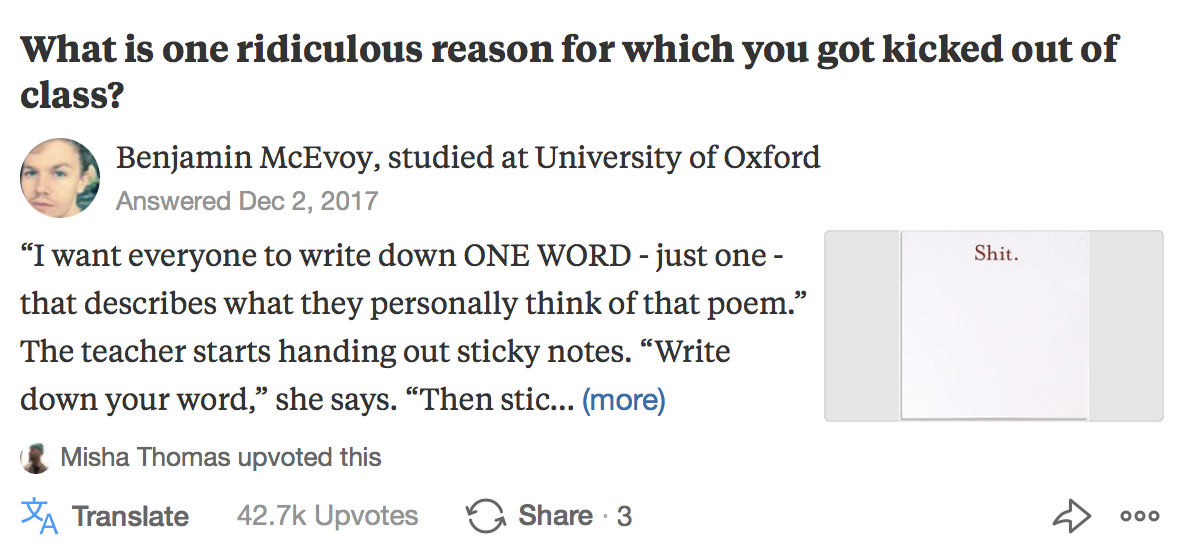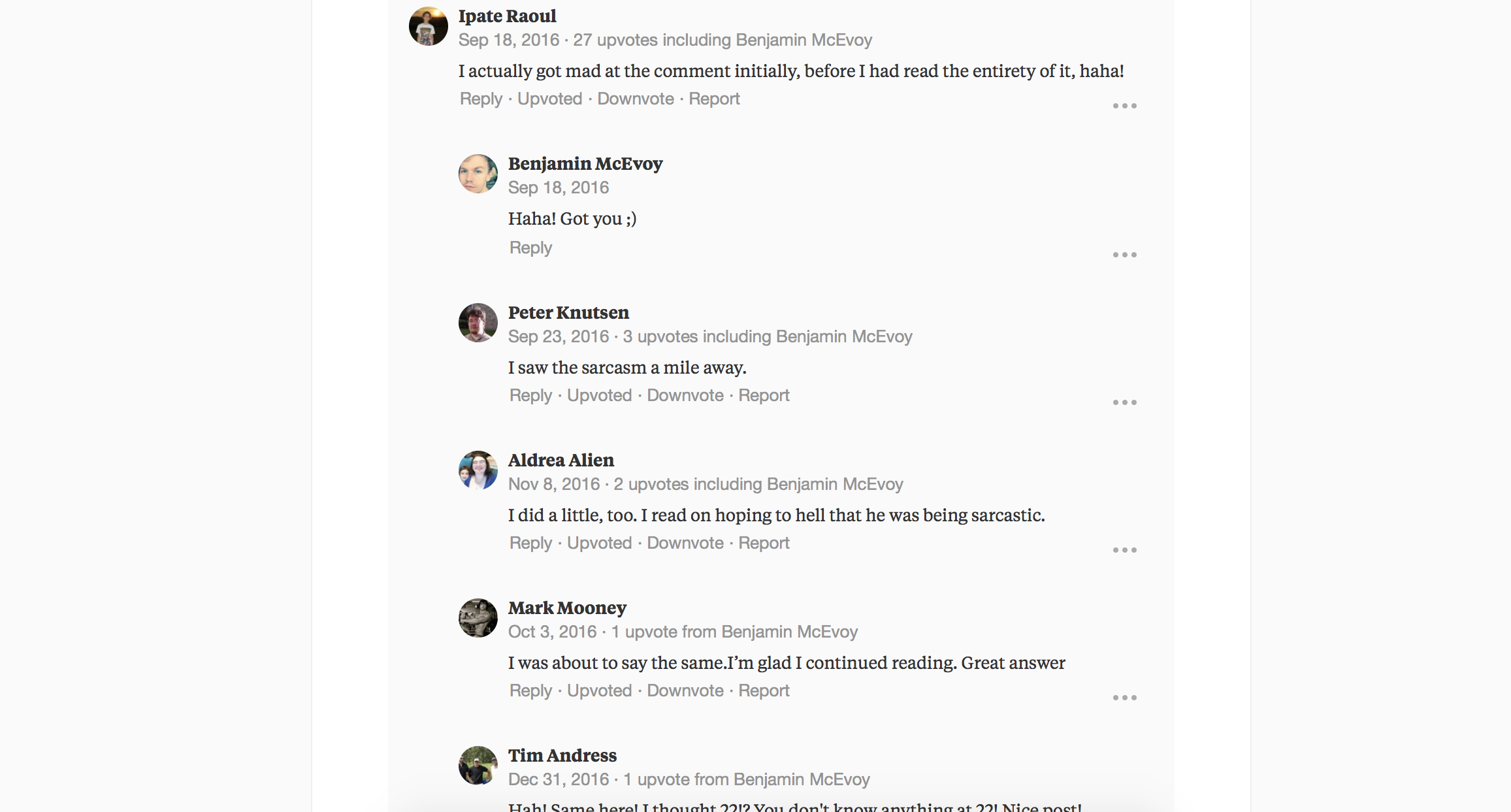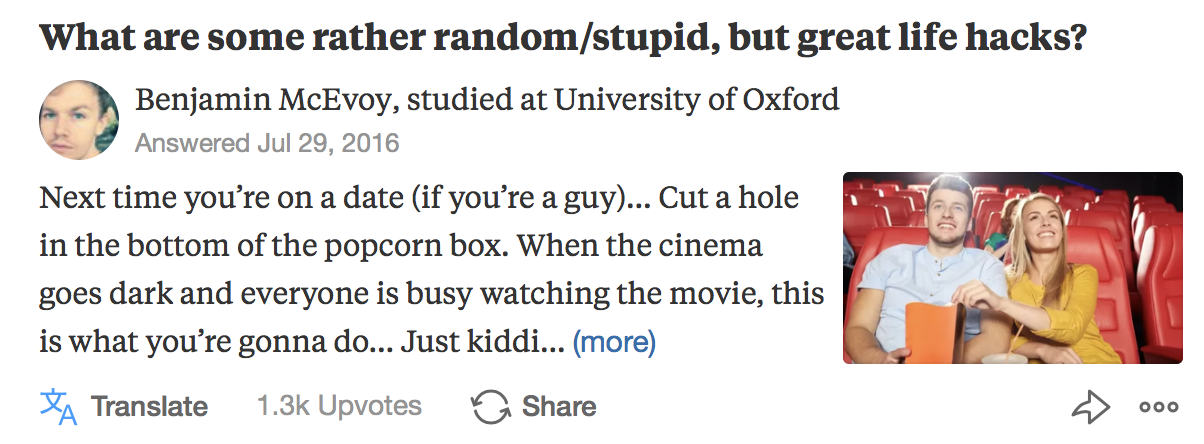My first Quora post was in 2015.
I was bored.
Didn’t really know what Quora was, but saw a question about studying that I thought I could answer.
It took me about 15 minutes to rattle off the answer.
I left it. Forgot about it. Came back a few weeks later and was blown away by the response.
That first answer currently has over a million views today, an angry conflicted (sometimes grateful) comment section, thousands of upvotes, and has been shared, translated, and plagiarised all across the internet.
How to Get Millions of Views on Quora (and Upvotes and Comments)
I never really got “serious” about Quora.
No doubt, there are a bunch of serious writers over there who crank out 10 answers a day and have millions of cult-like followers.
I could have been one of them if I wanted.
But from 2016-2017, I was interested in Quora as a way of driving traffic to my website.
I started this website in 2016 and no one was reading it.
I knew I’d have to wait a few months before organic search traffic kicked in and during that time I’d have to crank out a bunch of content.
But I didn’t wanna wait.
And looking at the first month’s statistics of 0 readers depressed the hell out of me.
So I remembered Quora.
I remembered the crazy response I got from that one answer and thought….
Hmmm…..
Here’s an opportunity to get some sloppy seconds spilling over from Quora onto my site.
If people liked what I wrote over there (where there was already a keen marketplace of eyeballs), then a few of them might follow over to my crummy one-bedroom apartment of a blog and maybe that traffic would make Mr Google think I was actually somewhat credible!
So I started writing regularly over at Quora at the same time I was writing on my blog.
And my thinking worked.
I started getting traffic to my website immediately.
Now I’m just gonna reinforce the fact that I’m NOT a Quora big shot.
I’ve got over 5,000 followers on Quora (at time of writing) and the majority of those surged during my most prolific writing times.
That means people liked certain answers I gave but I don’t have a cult.
Contrast that with Sean Kernan who currently has close to 170,000 followers and definitely has a cult of people who worship him on Quora.
If that’s your aim, go talk to Sean.
But my aim was eyeballs using the MED (minimum effective dose).
I didn’t have the time to be on the platform much.
I just wanted some big hits (super popular answers) that would result in a spillover to my website.
And I achieved that.
- This answer got over 30,000 views and over 3,000 upvotes.
- This answer got 110,000 views and close to 7,000 upvotes.
- This answer got over 130,000 views and over 2,000 upvotes.
- This answer got around 187,000 views and 6,500 upvotes.
- This answer got 205,000 views and over 2,000 upvotes.
- This answer got over 205,000 views and close to 11,000 upvotes.
- This answer got around 225,000 views and 11,000 upvotes.
- This answer got over 330,000 views and over 40,000 upvotes.
- This answer got close to 330,000 views and around 6,500 upvotes.
- This answer got 334,000 views and close to 43,000 upvotes.
- This answer got over 515,000 views and close to 3,000 upvotes.
- This answer got 1 million views and around 12,000 uptakes.
Cumulatively that’s 3.8 million answer views at time of writing.
Big answers like those ended up with me being awarded Top Writer status on Quora in 2017 (something I no longer have due to a dearth of content).
Maybe those metrics look pretty cool, but really a lot of those big numbers come from appealing to the masses who are scrolling on their phones while they’ve got Buzzfeed open in another tab.
A few of those answers have substance and I’m proud of them (like this one, and this one).
But I know that I have way less popular answers that got barely any views but which converted to people reading my blog way better than those big answers.
We’re just gonna talk about how to get hundreds of thousands of views and thousands of upvotes on Quora.
But a quick aside:
Once you know how to hit the big numbers and get the eyeballs on your work, make sure you’re not ONLY trying to go for the big ones.
Figure out why you want to be on Quora in the first place.
If you’re an expert in some small area, or your interests lie in areas that are niche, answers surrounding those topics are naturally gonna garner less eyeballs.
But the eyeballs you do get on those answers are so super targeted that they’ll often end up being more valuable to you and your aims than the big ones.
Keep that in mind!
And just before we dive in, another thing to keep in mind:
Quora is a very different place today from what it was when I started writing there.
When I started, Quora was still quite new and it was mainly experts in their fields answering engaging questions.
There were no adverts and it was a fascinating platform to get lost on – filled with quality content.
But about six months after I started writing, there was a wave (more like a deluge) hitting Quora with people using it as a vanity social media platform (some might say I was part of the problem… but not really).
That meant no longer was Quora a place for astrophysicists, private detectives, architects, and leaders of men to impart their knowledge.
Now the platform began to be filled with teenage girls clamouring for validation with selfies and angst-ridden posts, driving many of the academics away.
Today, Quora seems to been marred with advertising and the reading experience is way more spammy.
Now what I’m gonna tell you is still pretty timeless advice because it’s all about writing to capture attention.
But, because the platform has changed, your mileage, as with anything, may vary.
Now let’s get into the tips.
1 – Go for controversy
I’ve had quite a few “controversial” answers (I’ve deleted most of them now) but my most controversial was in my advice for how to study 10+ hours day.
If you look at that post today and then look at the comment section, you’ll likely be confused.
The comments section is filled with people shitting all over me for advice that’s not even in the post.

One of the many douchebags shitting on me in the comments… I made sure to upvote it though ‘cos dude had a point.
That’s because I edited the post and took out the controversial stuff.
My “advice”, which actually wasn’t advice at all but merely saying what I personally did to study for finals at Oxford, centred around taking a “Limitless style” smart drug.
I took that out because, although the controversy was good for initial views, I came to the conclusion that talking about that drug (something I no longer take, nor have interest in taking) on a platform like Quora might not be the best idea.
I didn’t want any old idiot who can’t do their own research taking something that might be illegal in their country or might not gel well with their system.
So I removed it (being all sensible) but that original post sure did make sure the article spread like fire.
Controversy works to gain eyeballs in a crowded market.
Think about Kanye.
Think about Trump.
Think about Conor McGregor.
Not saying you have to be like any of them.
You can be nice and controversial at the same time.
The controversy helps the shares, comments, and upvotes (most people might hate you, but state a strong position and the people who like you will really like you… and then upvote you), but you have to get the readers in the door first…
And you do that by the next tip…
2 – Have an attention-grabbing opening
Your first sentence or two are the most important because of the preview snippet Quora has.
You can’t view whole answers unless you click “more”.
And people won’t click “more” unless your preview really compels them.
Look at the openings of some of my most popular posts:
I often studied 14-16 hour days for a solid year when doing my final exams in Oxford University.
’Tel Aviv, Israel, 2011.
“You have bomb?”
“No.”
“You do. You do have bomb.”
“No, I don’t.”
“You are terrorist?”
‘I’ve probably consumed about ten pounds of paper because I thought it was part of a cake.’
‘Yes, my friend, 28 is too late to become a writer. The cut-off point for becoming a writer is 22. Even that’s pushing it a bit.’
‘I was giving a lecture to around 50 international high school students in my college at Oxford University. I got drunk before the lecture. I just wanted the paycheck.’
‘Westerners don’t realise what “sayonara” really means. You hear it all the time – particularly in Hollywood movies – when the characters want to sound cool when saying “goodbye”.’
‘I want everyone to write down ONE WORD – just one – that describes what they personally think of that poem.’ The teacher starts hanging out sticky notes.’
There’s a lot of different things going on in those openings.
Firstly, they’re solid statements.
No faffing, waffling, or beating around the bush.
What’s your point?
Say it in as economical way as possible.
Time is money and there are a lot of other answers (and media forms) out there competing for reader attention.
You’ll see as well some of these openings use narrative to get readers sucked into a story.
I purposely tried to make this answer read like a thriller.
People want to see what happens next.
When talking about the lecture I gave, once again I made it sound like a story.
It sounds like you and me are sitting down having a chat and it kind of feels like we were in the middle of a conversation.
I also threw some controversy in their too by saying I got drunk before the lecture…
It worked.
People shit on me once again in the comments.
The opening statement about studying 16 hours a day is a good one.
Not only because it’s outlandish, but because there’s some authority thrown in there.
The person reading wants to know how they can study longer.
So I threw my Oxford credential in there.
People seem to think I’m smart because I went to Oxford (I’m not as smart as people think though).
You can also take the comedic route.
Consuming 10 pounds of paper is pretty funny.
Firstly it’s an exaggeration (or hyperbole).
That’s fine.
It creates an image and again helps you stand out.
Don’t be afraid to exaggerate a little if it creates a funny image.
People know you’re exaggerating, but they wanna hear more because they’re expecting to laugh (and people in the comments did find this story funny).
Another authority effect comes in form of me “teaching” people what “sayonara” means.
There’s a hook here.
Something that compels you to read on.
I’m careful not to say exactly what people came for in the first couple of sentences because then they’ll have no read to click ‘more’.
Instead I build it up more, get people a bit more curious, and then naturally they want to find out the answer.
Curiosity is a very powerful tool.
Then you’ve got another outlandish statement in the form of me saying 28 is too late to be a writer.
Look at the comments section for that answer.
Pretty sure people were angry at me when they read that.
But then they read the whole thing and realised I was being sarcastic.
Again, sarcasm can be a form of exaggeration and you can get the controversy effect without being a complete dick.
Then you can flip it.
People love going through a range of emotions!
In the teacher example, once again I’m using narrative (present tense writing) and starting with dialogue so people are thrown right into the middle of the story.
If you start in the middle, just throwing the reader into the situation without preamble or warm-up, readers can’t help but keep reading.
It makes the experience seem effortless and natural.
They forget they’re reading and they actually start having the experience.
3 – Be the authority
This is just one angle you can approach Quora from.
You can write to move, entertain, or simply distract readers by offering something trivial yet amusing in the short-term.
Or you can write about something you know deeply about.
The thing about authority is you can’t fake it.
I don’t need to be a private investigator to know that Brad Robinson is legitimate.
This is the reason why the best writers in the world go to the experts for the fine details. When you read a novel by Clancy, King, Child, or Grisham, the fine details of firearms, law, etc. feel true even if you have no prior knowledge of those industries.
Your expertise/authority can be in anything.
No matter how trivial the experience, if you’ve experienced it you have the authority with which to discuss it.
Obviously the less trivial the subject, the more experience you need to have.
If you dropped out of law school after the first semester, you shouldn’t be answering legal questions.
People will see through you (even if they’re not lawyers, and especially if they are).
And also more qualified people will blow you right out of the water.
Answering topics about studying usually does well for me because I have the authority of being an Oxford graduate.
Students still in high school looking for study tips are going to trust what I say more than someone who doesn’t have that credential. Then it’s just up to me to package the answer in an attractive way.
4 – Know when to go deep
Some answers are just fluff.
They’re fun for people mindlessly scrolling through their phones.
But my most successful answers are the ones where I simply beat out the competition with comprehensiveness.
Most writers are lazy.
They’ll answer a question about best study tips or diet tips or whatever with a 200-word bullet-point list.
I know that putting in the work and offering up a 2,000-word answer when most people are giving 200-word answers will set me apart.
If you can go deep on a subject, then do so.
The longer a reader spends reading your words, the longer they are invested in you as a writer and the more memorable you are.
My long answers about studying (like this one) create trust and the reader feels like they know you.
Consequently, despite doing exactly zero advertising about consulting work regarding getting into Oxbridge or essay writing, I started receiving several requests a week from people who wanted my personal advice and were happy to pay for it.
I then went on to write a book on the subject, which in turn generated more interest (again, without any overt advertising that consulting is a service I offer).
5 – Give value
All of these tips are useful, but the most important thing you need to remember is this mindset shift.
Forget about what you want.
No one gives a shit that you want upvotes, comments, conversions to your sales funnel or whatever.
It all comes down to what’s in it for the reader.
How can you help them?
You’ve gotta be completely selfless here and genuinely approach answers with a desire to make the reader better off when they finish reading than they were when they began reading.
Like this article. Take a look at what I’m doing here.
Firstly it’s long-form and in-depth at close to 3,000 words.
But depth aside, I’m genuinely trying to help you and I’m writing down the advice that I think will lead to you becoming a better writer on the platform.
Obviously, you’re gonna need to put your own work in too, but this is as good a starting point as any.
Now go try it.
You can find your first answer by scrolling through and seeing where you can add value and be the authority in a way that is maybe controversial but always entertaining.
Good luck.
Bonus tip: pick a great picture
You only have a few words to play with to get the reader to click ‘more’.
But you can increase their curiosity with a well-curated picture.
Something that compliments the opening and paints a picture of what’s to come.






